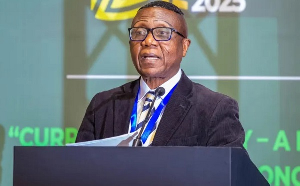Opinions of Saturday, 2 July 2011
Columnist: Enninful, Kingsley
Says Who?
Says Who? ... (Human rights Activists, Relativists and the Mystic Prophets of the Absolutes)
“I have the right to do what I want, it’s called human rights?”
Oh Really?
“I know my rights?”
Oh yeah?
“Who are you to judge me?”
hmmm?
The above may not surprise you if you are used to the early morning rush to work in a trotro in the streets of Accra. That is if you are lucky enough to catch a ride which has in it a radio tuned in to one of the morning shows, these comments and ideas would just bamboozle your already engaged mind.
Lately it’s no longer just the typical stereotypical partisan political gobbledygook but a new can of worms called homosexuality. There are a myriad of voices commenting on the issue. Human rights activists, relativists and even the Clergy.
I will add my voice… if you care to read on.
I recall a mild debate with a lady who claimed she was a human rights activist, a relativist, a free thinker and something rather sophisticated as that. She “didn’t believe in much of anything” she said. How could she begin to figure out if there even was a God? So I asked her if there was anything she felt was really, really wrong. She immediately spoke of practices that marginalized women. I said I agreed with her fully since I was a Christian who believed God made all human beings, but I was curious why she thought it was wrong. She responded, “Women are human beings and human beings have rights. It is wrong to trample on someone’s rights.” I asked her “Says who?
Puzzled, she said, “Everyone knows it is wrong to violate the rights of someone.” I said, most people in the world don’t ‘know’ that. They don’t have a western view of human rights. Imagine if someone said to you, ‘everyone knows that women are inferior.’ You’d say, ‘That’s not an argument, it’s just an assertion.’ And you’d be right. So let’s start again. If morality is not grounded in God as you believe and that morality just evolved from culture, why is it wrong for a culture to decide that marginalizing women is ok? There was silence for a while. I pointed out to her that in some cultures they love their neighbours in others they eat them and asked her if she had any personal preference.
Why did she insist that women have this great, unique individual dignity and worth? Why did she believe in human rights? “I don’t know,” the woman said, “I guess they are just there, that’s all.”
This conversation reveals how our culture differs from all the others that have gone before. People still have strong moral convictions, but unlike people in other times and places, they don’t have any visible basis for why they find some things to be bad and other things good. It’s almost like their moral intuitions are free floating in midair-far off the ground.
G.K. Chesterton was almost prophetic when he wrote of this:
‘…the new rebel (or human rights activists) is a skeptic, and will not entirely trust anything. He has no loyalty; therefore he can never be really a revolutionist. And the fact that he doubts everything really gets in his way when he wants to denounce anything. For all denunciation implies a moral doctrine of some kind; and the modern revolutionist doubts not only the institution he denounces, but the doctrine by which he denounces it. Thus he writes one book complaining that imperial oppression insults the purity of women, and then he writes another book in which he insults it himself. He curses the Sultan because Christian girls lose their virginity, and then curses Mrs. Grundy because they keep it. As a politician, he will cry out that war is a waste of life, and then, as a philosopher, that all life is waste of time. A man denounces marriage as a lie, and then denounces aristocratic profligates for treating it as a lie ... The man of this school goes first to a political meeting, where he complains that savages are treated as if they were beasts; then he takes his hat and umbrella and goes on to a scientific meeting, where he proves that they practically are beasts. In short, the modern revolutionist, being an infinite skeptic, is always engaged in undermining his own mines. In his book on politics he attacks men for trampling on morality; in his book on ethics he attacks morality for trampling on men. Therefore the modern man in revolt has become practically useless for all purposes of revolt. By rebelling against everything he has lost his right to rebel against anything.' 1
It is common to hear the educated man say, “No one should impose their moral views on others, because everyone has the right to find truth inside him or herself.” This dear friend if I may point out leaves you open to a series of very uncomfortable questions. Aren’t there people in the world who are doing things you believe are wrong – things that they should stop doing no matter what they personally believe about the correctness of their behavior? Like rape, child abuse, trafficking, drug abuse and so on. If you do (and everyone does!), doesn’t that mean you do believe that there is some kind of moral standard that people should abide by regardless of their individual convictions? This raises a question. Why is it impossible (in practice) for anyone to be a consistent moral relativist even when they claim that they are? The answer is that we all have a pervasive, powerful, and unavoidable belief not only in moral values but also in moral obligation.
“Moral”…is an orientation toward understandings about what is right and wrong, just and unjust, that are not established by one’s own actual desires or preferences but instead are believed to exist apart from them, providing standards by which our desires and preferences can themselves be judged.2
Our morals emanate from the very person of God and His commandments.
You may be tempted to retort “there goes the mystic prophets of the absolutes...God says this and God says that.
But if God is not the source…can you and I be the source of all morals.
When would it be impermissible to make the formal intellectual equivalent of what is known in barrooms and schoolyards as “the grand SAYS WHO”? In the absence of God…each…ethical and legal system…will be differentiated by the answer it chooses to give to one key question: who among us…ought to be able to declare “law” that ought to be obeyed? Stated that baldly, the question is so intellectually unsettling that one would expect to find a noticeable number of legal and ethical thinkers trying not to come to grips with it…Either God has spoken or He has not, but if He has not, nothing and no one else can take His place…3
The fact is if God has not spoken on the issue of homosexuality then all our moral statements on the issue are arbitrary, all our moral valuations are subjective and internal, and there can be no external moral standard by which a person’s feelings and values are judged.
This however leads to a rather shocking conclusion:
As things are now, everything is up for grabs. Nevertheless: Napalming babies is bad. Starving the poor is wicked. Buying and selling each other is depraved…There is such a thing as evil. All together now: Says who? God help us. 3
So when God says He hates the act of homosexuality it does not imply he hates the person who indulges in the act. For He forgave murderers (Moses), Adulterers (David) and even Prostitutes (Rahab). Truth is God as a Holy being hates SIN.
It is hard to avoid the conclusion that there is something fundamentally wrong with the world. Our biggest problem according to Christianity is sin. Yet the concept of “SIN” is offensive or ludicrous to many. This is often because we don’t understand what Christians mean by the term.
Sin is not merely the violation of an abstract law but of the personhood of God Himself.
Whatever weakens your reason, impairs the tenderness of your conscience, obscures your sense of God, or takes off the relish of spiritual things; in short, whatever increases the strength and authority of your body over mind, that thing is sin to you, however innocent it may be in itself.4
The world repeatedly gives you texts, that because you indulge in homosexual acts then you were born that way… God puts it in context that because you are His creation, created in His image you can become His holy son or daughter through His Son. And He, become your Father, if you would let Him.
The Christian way is different – both harder and easier. Christ says, “Give me ALL. I don’t want just this much of your time and this much of your money and this much of your work – so that your natural self can have the rest. I want you. Not your things. I have come not to torture your natural self…I will give you a new self instead. Hand over the whole natural self – ALL the desires, not just the ones you think wicked but the ones you think innocent – the whole outfit. I will give you a new self instead.” 5
The real question then is WHO ARE YOU?
You cry out….
Who am I?
Am I really all that which other men tell of?
Or am I only what I myself know of myself?
Restless and longing and sick, like a bird in a cage,
Struggling for breath, as though hands were
compressing my throats,
Weary and empty at praying, at thinking, at making,
Faint, and ready to say farewell to it all?
Who am I? This or the other?
Am I one person today and tomorrow another?
Am I both at once? A hypocrite before others,
And before myself a contemptibly woebegone weakling?
Or is something within me still like a beaten army,
Fleeing in disorder from victory already achieved?
Who am I? They mock me, these lonely questions of mine.
Whoever I am, Thou knowest, 0 God, I am Yours! 6
Your WORD is Sacred…..don’t lie to yourself.
Your BODY is Sacred….don’t abuse it for it is the temple of God.
Your TIME is sacred…don’t waste it for you shall give account of your life after death.
Your LIFE is sacred…cherish it
Here in is the conclusion of the whole matter.
I call heaven and earth to record this day against you, that I have set before you life and death, blessing and cursing: therefore choose life, that both thou and thy seed may live:7
Jesus is that LIFE. CHOOSE LIFE.
Says who?
Says GOD….Your Holy Father
References
1 Orthodoxy, G.K. Chesterton, 1909
2 Christian Smith, Moral Believing Animals; Human Personhood and Culture (Oxford University Prss; 2003. P.8)
3 Arthur Allen Leff, “Unspeakable Ethics, Unnatural Law,” Duke Lew Journal (Dec. 1979)
4 Susanna Wesley: The complete writings by Susanna Annesley Wesley, Oxford University Press US, 1997, p 169
5 Dorothy L. Saayes, creed or chaos? (Harcourt and Bruce, 1949) pp. 38-39
6 Who am I? Dietrick Boenhoeffer
7 Deutoronomy 30:19, King James Version Amplified
Name: Kingsley Enninful
Email: kingsleyenninful@yahoo.com














